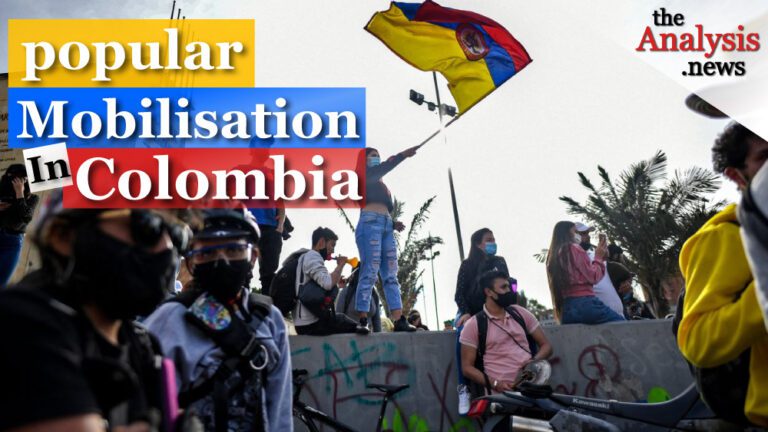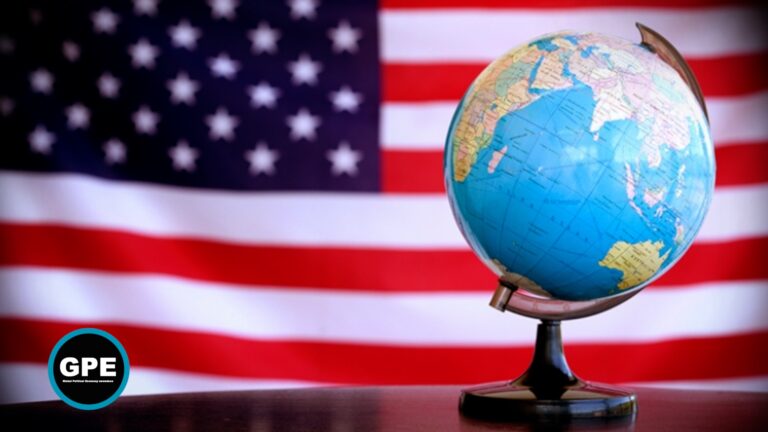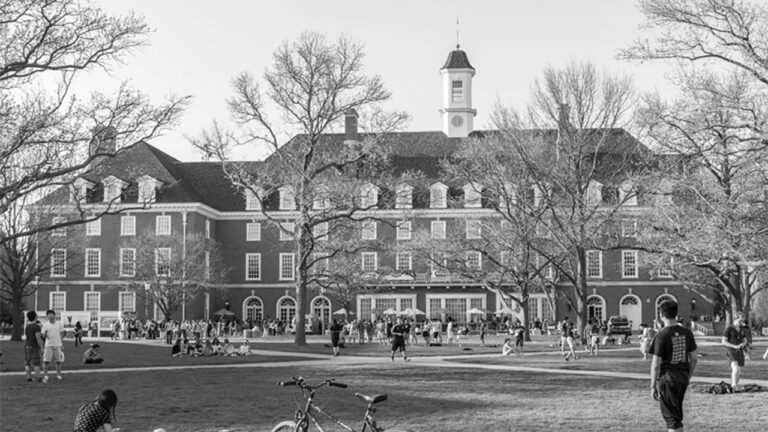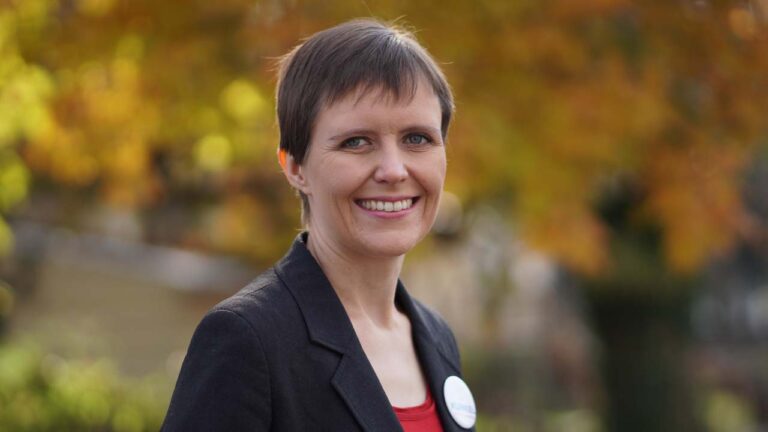The coronovirus pandemic exposes the consequences of taking the neoliberal road decades ago, explains Prof Radhika Desai. She discusses the failures of the Western capitalist system and the need to reorient our societies and economies.
Transcript
LYNN FRIES: As a crisis in capitalism, why is the coronavirus pandemic different from previous crises in the neoliberal era? Here to discuss that with me is Radhika Desai. I’m Lynn Fries and this is Global Political Economy or GPEnewsdocs. Radhika Desai joins me from Canada where she is a Professor of Political Studies at the University of Manitoba and Director of the university’s Geopolitical Economy Research Group. She is the author of numerous titles including Geopolitical Economy: After US Hegemony, Globalization and Empire.
We’re talking about The Unexpected Reckoning: Coronavirus and Capitalism, an OPED in which Professor Desai makes the case that with the onset of the coronavirus pandemic Western society is now staring a long-term reckoning in the face. Long term as it has been building up for decades since Western capitalism took the neoliberal road out of the 1970s crisis. Professor Desai, welcome.
RADHIKA DESAI: Thank you, Lynn.
FRIES: Radhika, start by giving us some background on the neoliberal turn of the Western capitalist system.
DESAI: Essentially what happened is that capitalism seemed to have become unable to reconcile the competing demands: keep productivity rising, which would then allow the workers to gain higher wages, et cetera so there was a crisis. As you will remember, there also emerged a new right. The new right was personified in, in Margaret Thatcher and Ronald Reagan. And you will also remember that throughout the 1970s, there was also a lot of labor unrest. And if this were not enough, Third World countries, the producer of the commodities which are critical to the West, began demanding higher prices for their products. So, amid all of this chaos and mayhem, there was a contest between left and right. The right said – we have to move in a different direction. There was too much regulation in the sixties and the so-called Golden Age. It has destroyed capitalism’s mojo and now we have to remove the ‘dead hand’ of the state and we have to allow capitalism to flourish in an unfettered fashion. The new right won the day. And what we have been seeing is the unfolding of the consequences of that major turn that was taken at the end of the 1970s. So essentially, what we can see is that over the last four decades, we have had in most of the world really, not all, but most of the world we have had the application of neoliberal strategies which essentially means that you increase the freedom of capital to do what it likes and by contrast you decrease the freedom of labor. You reduce the demands of society in terms of labor or environmental or other regulations and so on.
FRIES: So that in a nutshell is what you mean when you talk about the neoliberal strategy to reinvigorate capitalism.
DESAI: Reinvigorate capitalism and get its animal spirits up again and then it was going to essentially start investing and so on. In reality, this did not happen.
FRIES: Explain the reason for that.
DESAI: Part of the reason why investment demand does not expand is because if you are a capitalist and you look around you, you look at the very sad demand conditions, consumption demand conditions, you say well now is not the time to invest. So this is the one of the simplest and the most basic problems. And the reason for that is simply because neoliberalism has cut back state expenditure which often – in most countries – is the source of a fair degree of demands both investment and consumption. Because governments produce services; they invest in productive equipment; they invest in infrastructure, etcetera – so all of this has tended to be reduced. And of course, consumers cannot decrease their demand. Because both workers and other small producers – including all the small producers in Third World countries and of course also small business people in First World countries – all of these people have been squeezed in one form or another by being offered low wages and low prices. Neoliberalism has essentially not permitted demand to expand.
FRIES: So what was happening?
DESAI: What was happening is that the profits that were being made, and of course with increasing freedom of capital more profits were being made and these profits were being diverted into what we may call financial investments. The best way of understanding the difference between the two, because we confusingly use the same words to talk about investing in the stock market and to talk about investing in a mill or a factory is this. A productive investment essentially is investment to produce new goods and services which we always need. Whereas financial investment is simply an investment in assets or in paper representing assets that have already been produced so that does not add to our productive capacity. So, more and more investment went in the direction of financial investment. And this investment not only does not expand productive capacity, in many ways it strangles productive capacity. Because by holding out the prospects of making even more money in financial investment, you actually lead to further declines in productive investment. Plus it tends to exacerbate inequality. Neoliberalism in general exacerbates inequality. As we know, for the last 40 odd years in most Third World countries, wages have either risen exceeding slowly – real wages have risen exceedingly slowly – or they have been stagnant such as in the United States.
Neoliberal policies put money in the pockets of people who are less likely to spend it either in their personal consumption or in investment in productive investment this simply means that demand has not expanded, the only thing that has expanded are financial bubbles, the chase for profits which can be made without producing anything.
FRIES: So this is the situation we are in after decades of neoliberalism.
DESAI: In the 1950s and ‘60s, financial crises were much less frequent quite simply because we didn’t have neo-liberalism, because businesses and financial corporations did not have the freedoms that they have in the new liberal period but now we have frequent financial crises.
There just was not that kind of financialization. So we didn’t also have financial crises but now we have frequent financial crises.
The productive structure that is now under attack – that is now being threatened by the new pandemics – has been weakened by four decades of neoliberalism. One simple way of looking at it is that it has been weakened because, of course, credit is harder to come by and more difficult to obtain and often very fickle. These productive companies themselves have had to report higher degrees of profitability so they have tended to invest abroad in search of the lowest possible wages but this also means that there are all sorts of other threats. The longer and more complicated the supply chains, the more any stage of it can be disrupted. So it brings an extra degree of fragility to the productive structure.
The other thing that has happened as a result of neoliberalism is that because the productive economy has not expanded and because people must, at the end of the day, find some sort of work what has expanded is services. Some of his expansion is not necessarily a bad thing but over-expansion can be, especially where this labor could be diverted to producing things that are needed. Anyway, we have an overextended service sector and certainly most service sector activities require face to face production. When these are affected that means a very large part of the economy on which ordinary people depend has been disrupted.
FRIES: That’s an example that really clarifies what you mean in saying this time around the real economy has been affected and why that’s bound to make this crisis different from previous crises in the neoliberal era.
DESAI: The problem is arising from the fragility of our productive economy and this shock of the pandemic has actually exposed that fragility. So that’s the reason why monetary policy can no longer play a role. Even after the announcement of the $2 trillion stimulus by the US Federal Reserve, markets are not convinced that this is what we need. This is not going to be enough.
There have been financial crises all along. And all along, the message could have been read in these crises that these crises are happening because what is happening is that the financial economy is expanding at the expense of the productive economy. But rather than understanding this, what has happened is that going back to the 1987 stock market crash, our government and public authorities including central bankers have had a very different reaction. They have said: Oh, there is nothing wrong with our productive economy. Ev erything is hunky-dory. All we have to do is ride out this financial crisis.
FRIES: In your OPED you talk about this in terms of the crisis in crisis management.
DESAI: The realization should have sunk in that this is no way to run an economy. We really need to put a stop to financialization. We really need to reorient our economies in a big way but the message was not heard. People began… central banks and neoliberal Western governments continued their merry way down the neoliberal and financializing road.
Inventive monetary policy fixes was mesmerizing the public and making them think that there are all these, you know, masters of the universe were out there. They were straining every gray cell to try to solve the problem of our economy. None of these are actually capable of solving the problem. In fact, if anything, they were making it worse because they were spurring on for the financialization which only spurred on further inequality over the last decade since the 2008 financial crisis. Inequality in the Western world which was already at legendary high levels was further exacerbated. That’s all it accomplished.
But all of this talk also acc omplished something yet. And that is, it prevented us from talking about that part of government policy which could have achieved results and which we needed sorely to achieve results. And that’s fiscal policy. Sounds like a fancy word, but all it means is that the government spends money. It can spend money either by taxing and certainly there’s a lot of room for taxing those with obscene amounts of wealth. There are plenty of those people today. And it can also do so by borrowing, obviously within reason but there is a fair degree of room to borrow at the present exceedingly low interest rates.
So fiscal policy was the thing to do – massive expansion of government’s own demand and rectification of the inequality of incomes by a more progressive taxation policy. The neoliberal decades, 40 years of tax policy has moved in a regressive direction, asking poor people to pay more money than rich people do, proportionately. Let’s look at it this way, neoliberalism was supposed to restore the animal spirits of capitalism, restore the mojo of capitalism and it has not done that. Well, what is the other agency that can invest, pay people and create employment? Invest and expand demand on its own, etcetera? It’s the government. And if this government is democratically controlled, then we can all democratically control the direction in which government fiscal policy is directed. And that means that we should move from essentially having government spending go into the pockets of rich people to government spending going into the pockets of and serve the needs of the vast majority of ordinary people in every country.
One of the things that this crisis has also made us realize is that there’s something fundamentally wrong about the way we interact with nature. I mean before the pandemic hit, already the issue of climate change had become very big. We have had the most unusual winters and summers and all of that in the last many years. And particularly over the last couple of years, this has been quite obvious to people. So add to that this pandemic which also throws up another very problematic aspect of our relationship with nature which is how we farm animals and the destructive character of our relationship with nature. I think that any progressive solution can also take care of that because we will be in a position to determine for ourselves democratically how we want to organize our relationship with nature. Instead of leaving it to capitalist companies who engage in large scale factory farming and other forms of environmental destruction that have got us to this point. Because practically every measure of environmental destruction will show you that things have gotten considerably worse in the neoliberal period; the destruction of the environment has actually accelerated during this neoliberal period. So that is another chance to take a deep breath, to take a pause and say: Is this the direction in which we really want to go and can we use the present a crisis as an opportunity to reorient our societies and our economies.
FRIES: Radhika Desai, thank you.
DESAI: Thank you, Lynn
FRIES: And thank you for joining us. From Geneva, Switzerland this has been news and analysis of
the global political economy by GPEnewsdocs.
Radhika Desai is Professor at the Department of Political Studies, and Director, Geopolitical Economy Research Group, University of Manitoba, Winnipeg, Canada. Professor Desai is author of Geopolitical Economy: After US Hegemony, Globalization and Empire and co-editor of Karl Polanyi and Twenty-First-Century Capitalism among numerous other titles and additional works.






